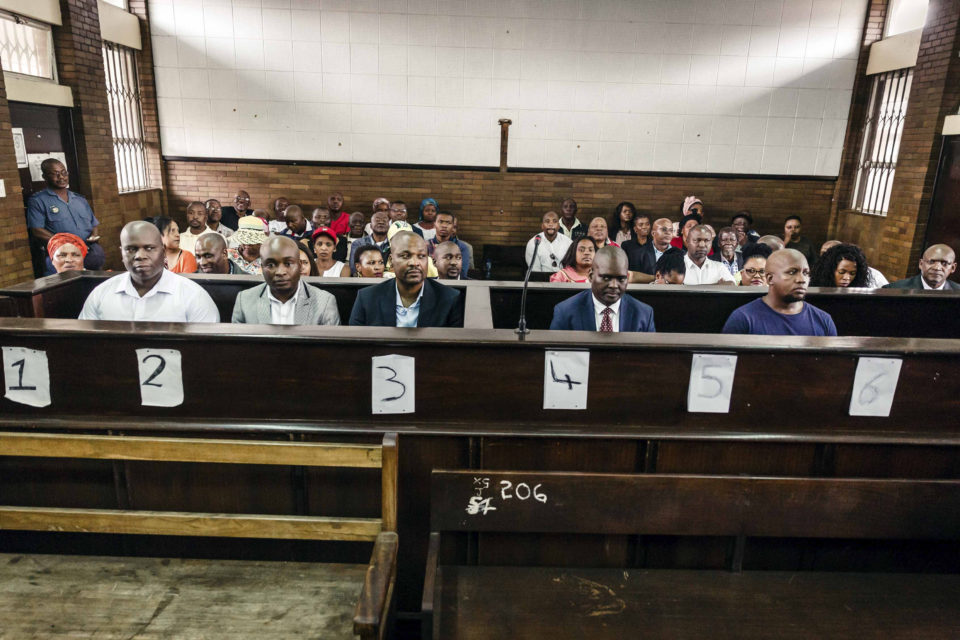Unravelling the machinery of political murder
Part two of a series on political killings in South Africa details this week’s cross-examination of some of those accused of the murders of KwaZulu-Natal local politicians.
Author:
29 March 2019

An intricate web of former policemen, cash-in-transit robbers, hit-men and, possibly, politicians, started to reveal itself in the uMzimkhulu Magistrate’s Court in KwaZulu-Natal’s southern Midlands this week.
Charges against Harry Gwala District Municipality mayor, Mluleki Ndobe, and the uMzimkhulu local municipality’s manager, Zwelibanzi Sikhosana, for the premeditated murder of former ANC Youth League Secretary General, Sindiso Magaqa, and the attempted murder of two uMzimkhulu councillors, Nontsikelelo Mafu and Jabu Masiya, were provisionally dropped at their bail application hearing on Monday.
But, as the hearing for the three remaining co-accused resumed on Tuesday, it slowly became evident that work by the police task team investigating political assassinations in KwaZulu-Natal had provided state prosecutor Sohana Moodley with a tight case with which to pursue convictions.
Related article:
While leading evidence in court, which included geographical information about alleged cellphone usage by the three co-accused, another alleged hit-man and his driver on the day of Magaqa’s shooting, Moodley strongly suggested the existence of a criminal cell involved in a variety of violent crimes in the province.
On Tuesday, there was only time to hear the bail application for accused number one, Sbonelo Myeza, who was remanded in custody with his fellow co-accused, Mbulelo Mpofana and Mxolisi Ncalane. The bail application hearing will continue on 8 April.
Cross-examination
During cross-examination Myeza confirmed to Moodley that he knew both his co-accused; another alleged hit-man and cash-in-transit robber, Jabulani “Sgoro” Mdunge; and Sibusiso Ncengwa, who will appear separately in the regional magistrate’s court on 24 April on charges linked to Magaqa’s murder. Mdunge was killed last year in a foiled cash-in-transit robbery.
Myeza is a former policeman who belonged to the highly trained, and often violent, tactical response team unit known as the “amaBerets”. He resigned from the South African Police Service (SAPS) in April 2013. Myeza admitted to the court that he knew Ncalane because they grew up in the same area in Northern KwaZulu-Natal, before working together in the police service.
According to Myeza, he became acquainted with Mpofana, “who is now one of my friends”, through Ncalane. Myeza confirmed that he also knew Mdunge, who was a “friend of a friend” and Ncengwa, whom he described as a “taxi-owner and loan shark”.
Moodley said the prosecution had cellphone records, including an exchange of over 30 calls between the three accused, Mdunge and Ncengwa on the day in July 2017 when Magaqa was shot; he died later, in September 2017.
Small-town coincidence
These calls, Moodley said, placed all the accused in uMzimkhulu, which she found “strange” since there appeared no valid explanation for their being in “such a small town” all on the same day. The accused all live in Durban.
Myeza had earlier told the court he had been looking for a child born out of wedlock who, he was led to believe, might be living in the areas around Harding, Ixopo and uMzimkhulu. Moodley had dismissed this explanation as fabricated and wondered aloud as to how a former policeman would use such a rudimentary method as “going from door-to-door, knocking on them” to find his purported child.
Myeza told the court that he worked as an agent for a company called Maritime Operations. It deals specifically with the import and export of guns and ammunition into South Africa, providing a variety of services from obtaining clearances for firearms coming into or out of the country to security guards on ships under potential threat of piracy along the east coast of Africa.
Myeza told the court that he had travelled to Swaziland and Mozambique in the last six months but refused to go into great detail about the reasons for his visits aside from saying that there was a “project” there.
Cash-in-transit van coincidence
Under cross-examination, Myeza also confirmed that his wife worked for G4S Cash Solutions. Moodley asked Myeza whether he was “surprised to know” that Mdunge had been killed in a shoot-out while trying to hijack a G4S cash-in-transit vehicle in September last year.
Myeza said he was surprised at the time, but not since, as he had read about Mdunge’s death on the road between Kokstad and Harding in the media. Moodley said she found it was “amazing” that Mdunge and his fellow robbers were intercepted while en route to highjacking a G4S vehicle, specifically.
During the bail hearing, Myeza refused to answer several questions for fear of incriminating himself. He even initially refused to acknowledge owning a red BMW, eventually confirming that he did and that it was registered in his brother’s name.
Moodley told the court that the prosecution had a witness who would confirm Myeza’s red BMW drove up next to the car in which Magaqa was sitting, and idled for a while, a few minutes before men in a grey Mercedes Benz drove up and opened fire on the vehicle. She also told the court that the prosecution intended to lead evidence from a witness who was present when the accused were plotting to kill Magaqa.
The separation of Ncengwa’s trial suggests that the state may be preparing to enter into a plea bargain with the alleged hit-man in exchange for testimony against his fellow accused.
Concern at dropped charges
It remains unclear why charges against Mdobe and Sikhosana were dropped on Monday. Moodley told the court the prosecution had been waiting for more information to back up what they had on the two ANC members, but when it did arrive it was insufficient enough to make it “unfair” to continue remanding them in custody.
Moodley refused to give further reasons to New Frame after Tuesday’s proceedings, saying it would jeopardise her case.
In a statement on Thursday, national director of public prosecutions, Shamila Batohi, expressed her “extreme concern” that charges were dropped “due to a lack of evidence”. According to the statement Batohi has asked for a report from the provincial director of public prosecutions regarding the matter.
With several of their leaders implicated in political assassinations the ANC in the province, meanwhile, has taken a decision to remove anyone accused of murder from their provincial election lists before the elections on 8 May.
This is part of a series, Killing Fields, which investigates political killings in South Africa.
Part one: Political assassination the currency of corruption

